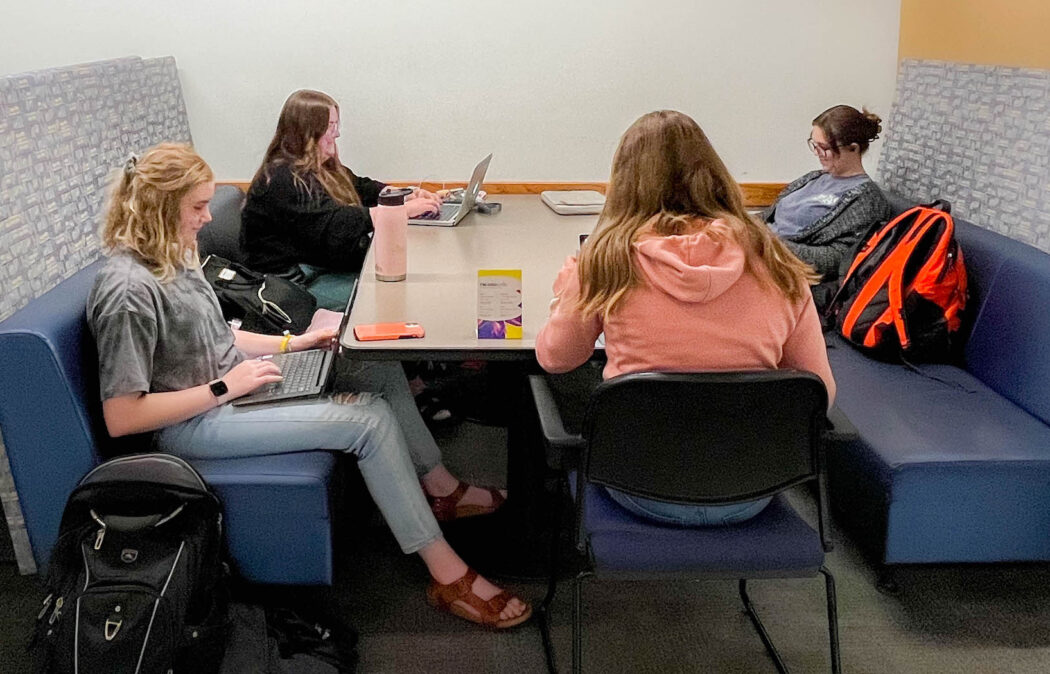Learning specialists provide finals week wisdom
“No matter what happens, your value is infinite and it’s certainly a lot more important than how you perform on a test,” said Heidi Hodgson, the learning specialist of TRIO Student Support Services. “A lot of students get super stressed and they tie their self-esteem to their grades and that’s not healthy.”
As students approach finals week, many try cramming in their studying. But according to Hodgson, this is not the most efficient way for students to complete their work.
“Don’t study for many hours. Every hour, you need a 10-minute break,” Hodgson said. “Even if you think you don’t really, your brain power goes away. Your body might be there, but your brain is not as engaged.”
Melanie Chambers, a learning specialist with the provost office, said instead of having one big study session the night before your final, you should break it up into a little bit each day.
“Treat those sessions like a doctor’s appointment,” she said. “If you must miss your session, then reschedule it — that way the information will be stored in your long-term memory and not be forgotten after the test.”
Students have many resources available to them to help when preparing for their finals, and they should utilize their course material, textbooks, notes, class presentations, any prior recordings of lectures, study groups and on-campus resources like tutoring centers.
Hodgson said students “can totally control how you prepare with the material that you’re responsible for.”
When students know the material their professors have been teaching over the past few months, it makes it easier to know what may be on their final exam. This can greatly help students prepare and not spend time reviewing other material.
According to Hodgson, students tend to stress out and in turn, eat unhealthily and get less sleep, but this is counterproductive.
“Students should be eating healthy food — fruits, vegetables, yogurt, et cetera and drinking lots of water,” Hodgson said. “Whatever helps you feel healthy, because you’re really just trying to give your brain what it needs to do well.”
According to Chambers, burnout occurs when students don’t take care of themselves, which is very common during finals week.
“During one of my classes on testing, one student said they reward themselves after every test they take by going out to eat,” Chambers said. “I think recognizing the progress you have made this semester is important.”
Pulling an all-nighter before your test decreases your brain’s ability to process information and your cognitive ability. Hodgson said it’s like losing IQ points. When studying properly, your brain takes time to make connections between what you’ve heard in lectures.
Studying in a good learning space like the library or a classroom will improve a students’ studying. The worst places to study are your bed or your couch. Your brain seeks meaning and patterns and repetition, which doesn’t happen in these places, so your brain can’t do its best work, Hodgson said.
“Keep in mind that a little anxiety is actually useful. It motivates you to study and care about your work,” Chambers said. “It becomes a problem when the anxiety shouts louder than your ability to concentrate.”
Most people experience test anxiety, but being prepared is the best way to avoid this.
“It’s good to remember that anxiety can either be a positive thing — if you think in a positive way, ‘I’m excited, I’m psyched for this, I get to show what I’ve learned.’ That really helps your brain to perform better,” Hodgson said. “And if you feel, ‘I’m so anxious, I’m going to fail my test’ or this kind of negative self-talk, that can also impact your performance.”
Cheating is never the answer. Most students are under a great deal of stress as they approach finals, but there are better ways to get a passing grade.
“Your integrity is worth a lot more than performance on any one test, and remember — you’re not your grades,” Hodgson said.
During your test, if you’ve read the question thoroughly and choose an answer, it’s better not to change it. When doing multiple-choice questions, read the sentence and sentence stem, think of the answer and then find the answer in the choices provided. Other ways to prepare for tests and methods to take tests can be found at usu.edu/academic-support/test/index.
Hodgson said students should keep their head in the game, knowing they’ve been working hard since January, and it’s important to not fall apart at this point.
Photo by Katara Barlow

